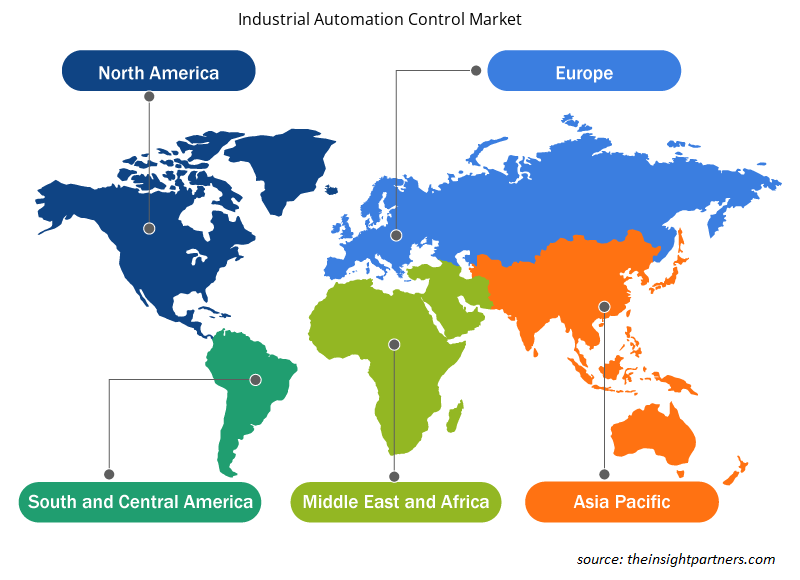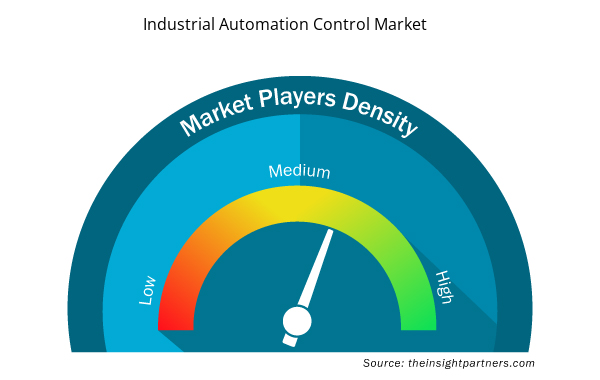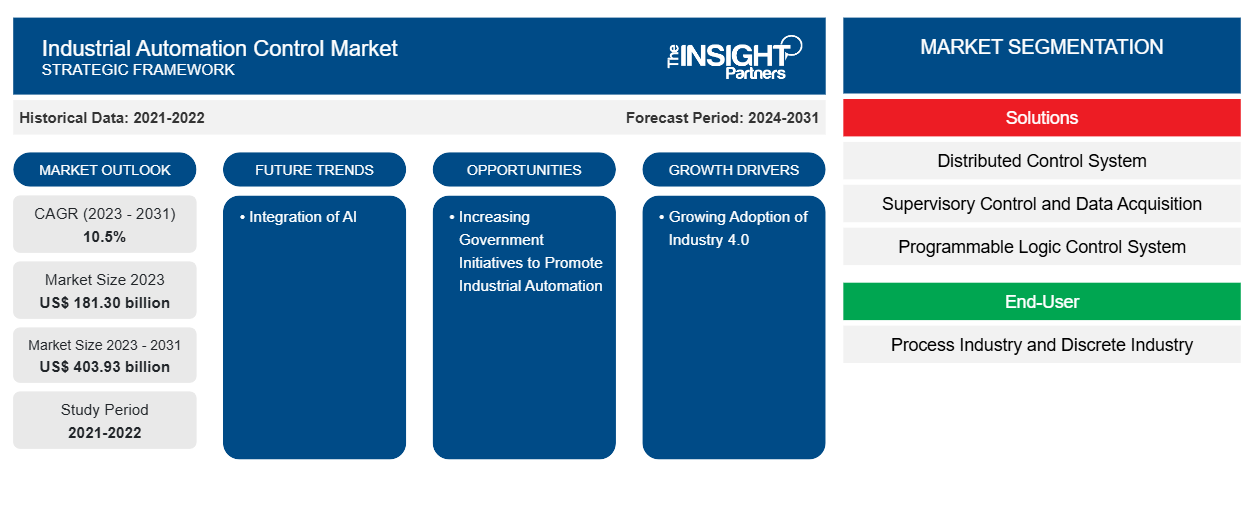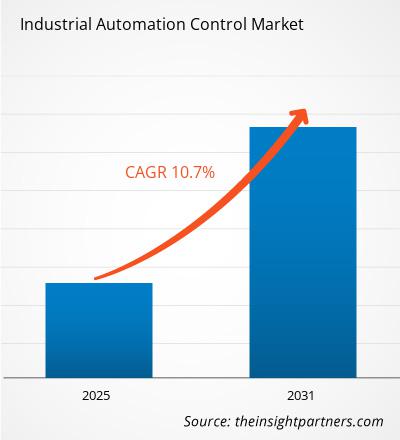Se proyecta que el tamaño del mercado de control de automatización industrial alcance los 403,93 mil millones de dólares estadounidenses para 2031, frente a los 181,30 mil millones de dólares estadounidenses en 2023. Se espera que el mercado registre una CAGR del 10,5 % entre 2023 y 2031. El sector industrial ha crecido significativamente debido a la integración continua de tecnología moderna, como robots, inteligencia artificial y otras soluciones innovadoras.
Análisis del mercado de control de automatización industrial
Los sistemas de automatización pueden escalar desde pequeñas unidades independientes hasta una red de células de trabajo interconectadas a gran escala distribuidas por toda la planta de fabricación. Cada sistema está diseñado a medida para una actividad específica, lo que genera ahorros de costos, mayor calidad, seguridad para el operador y mayor producción. Las tecnologías de análisis, nube y móviles están ayudando a las empresas a lograr sus objetivos de manera más eficiente. Además, el auge de la Internet de las cosas ( IoT ) en la automatización industrial está impulsando la demanda de una fabricación inteligente para adoptar e implementar los beneficios de la conectividad a Internet.
Descripción general del mercado de control de automatización industrial
El sector industrial ha evolucionado rápidamente debido a la introducción constante de tecnología sofisticada como la robótica , la inteligencia artificial y otras. Además, al utilizar una infraestructura industrial inteligente, la automatización permite operaciones de fabricación y manipulación de materiales más rápidas. Las industrias están instalando tecnologías de automatización y control industrial en un esfuerzo por impulsar la producción y ahorrar gastos de mano de obra. Además, con la introducción de la Industria 4.0, el sector manufacturero ha visto una rápida adopción de nuevos sistemas y arquitecturas de red mejoradas, lo que se espera que brinde perspectivas considerables para la expansión del mercado.
Personalice este informe según sus necesidades
Obtendrá personalización en cualquier informe, sin cargo, incluidas partes de este informe o análisis a nivel de país, paquete de datos de Excel, así como también grandes ofertas y descuentos para empresas emergentes y universidades.
- Obtenga las principales tendencias clave del mercado de este informe.Esta muestra GRATUITA incluirá análisis de datos, desde tendencias del mercado hasta estimaciones y pronósticos.
Factores impulsores y oportunidades del mercado de control de automatización industrial
La creciente adopción de la Industria 4.0 favorecerá al mercado
La creciente implementación de los principios de la Industria 4.0 es una fuerza impulsora importante en la industria de la automatización industrial global. La Industria 4.0, también conocida como la cuarta revolución industrial, se centra en la integración de tecnologías digitales en los procesos de producción tradicionales para mejorar la eficiencia, la productividad y la flexibilidad. Uno de los componentes importantes de la Industria 4.0 es la adopción generalizada de tecnologías de automatización avanzadas, como la robótica, los sensores mejorados y la computación en la nube. Estas tecnologías permiten una comunicación y colaboración fluidas entre máquinas, sistemas y personas, lo que da como resultado operaciones más eficientes y mejores procesos de toma de decisiones.
Aumentan las iniciativas gubernamentales para promover la automatización industrial
Las medidas gubernamentales cada vez más numerosas para promover la automatización industrial ofrecen perspectivas sustanciales en la industria global de control de la automatización industrial. Los gobiernos de todo el mundo se están dando cuenta rápidamente del potencial de la automatización para mejorar la productividad, la eficiencia y la competitividad en los sectores industriales. Como resultado, están desarrollando una variedad de normas y programas para alentar a las empresas a utilizar tecnologías de automatización. Estas iniciativas con frecuencia adoptan la forma de exenciones impositivas, subsidios, subvenciones y programas de capacitación para alentar a las empresas a invertir en tecnologías de automatización.
Análisis de segmentación del informe de mercado de control de automatización industrial
Los segmentos clave que contribuyeron a la derivación del análisis del mercado de control de automatización industrial son las soluciones y los usuarios finales.
- Basado en soluciones, el mercado de control de automatización industrial está segmentado en sistema de control distribuido ( DCS ), control de supervisión y adquisición de datos ( SCADA ), sistema de control lógico programable ( PLC ), interfaz hombre-máquina ( HMI ), gestión del ciclo de vida del producto ( PLM ), otros.
- Por usuario final, el mercado se segmenta en industria de procesos e industria discreta.
Análisis de la cuota de mercado del control de la automatización industrial por geografía
El alcance geográfico del informe de mercado de control de automatización industrial se divide principalmente en cinco regiones: América del Norte, Asia Pacífico, Europa, Oriente Medio y África, y América del Sur/América del Sur y Central. Esta rápida expansión en Asia Pacífico se debe a la presencia de importantes actores de la industria y empresas en crecimiento en la región. Además, la creciente demanda de mejores soluciones para gestionar plantas industriales en China e India está impulsando la expansión del mercado en la zona. El uso de instalaciones de producción inteligentes en lugar de instalaciones de producción tradicionales es una tendencia común y contribuye a la amplia aceptación de la automatización industrial, que está impulsando la expansión del mercado en toda la zona.
Perspectivas regionales del mercado de control de automatización industrial
Los analistas de Insight Partners explicaron en detalle las tendencias y los factores regionales que influyen en el mercado de control de automatización industrial durante el período de pronóstico. Esta sección también analiza los segmentos y la geografía del mercado de control de automatización industrial en América del Norte, Europa, Asia Pacífico, Medio Oriente y África, y América del Sur y Central.

- Obtenga datos regionales específicos para el mercado de control de automatización industrial
Alcance del informe de mercado de control de automatización industrial
| Atributo del informe | Detalles |
|---|---|
| Tamaño del mercado en 2023 | US$ 181.30 mil millones |
| Tamaño del mercado en 2031 | US$ 403,93 mil millones |
| CAGR global (2023 - 2031) | 10,5% |
| Datos históricos | 2021-2022 |
| Período de pronóstico | 2024-2031 |
| Segmentos cubiertos | Por Soluciones
|
| Regiones y países cubiertos | América del norte
|
| Líderes del mercado y perfiles de empresas clave |
|
Densidad de actores del mercado de control de automatización industrial: comprensión de su impacto en la dinámica empresarial
El mercado de control de automatización industrial está creciendo rápidamente, impulsado por la creciente demanda de los usuarios finales debido a factores como la evolución de las preferencias de los consumidores, los avances tecnológicos y una mayor conciencia de los beneficios del producto. A medida que aumenta la demanda, las empresas amplían sus ofertas, innovan para satisfacer las necesidades de los consumidores y aprovechan las tendencias emergentes, lo que impulsa aún más el crecimiento del mercado.
La densidad de actores del mercado se refiere a la distribución de las empresas o firmas que operan dentro de un mercado o industria en particular. Indica cuántos competidores (actores del mercado) están presentes en un espacio de mercado determinado en relación con su tamaño o valor total de mercado.
Las principales empresas que operan en el mercado de control de automatización industrial son:
- Compañía: ABB Ltd.
- Automatización industrial B&R GmbH
- Bosch Rexroth AG
- Beckhoff Automation GmbH & Co KG
- Compañía Eléctrica Emerson
- General Electric
Descargo de responsabilidad : Las empresas enumeradas anteriormente no están clasificadas en ningún orden particular.

- Obtenga una descripción general de los principales actores clave del mercado de control de automatización industrial
Noticias y desarrollos recientes del mercado de control de automatización industrial
El mercado de control de automatización industrial se evalúa mediante la recopilación de datos cualitativos y cuantitativos a partir de investigaciones primarias y secundarias, que incluyen publicaciones corporativas importantes, datos de asociaciones y bases de datos. A continuación, se incluye una lista de los avances del mercado:
- En abril de 2023, OMRON lanzó los controladores de automatización NX502 de la serie NX con control avanzado de la información y control de seguridad, simultáneamente con las nuevas unidades NX-EIP201 EtherNet/IPTM. Este lanzamiento responde al aumento de los esfuerzos por lograr la neutralidad de carbono en las plantas de fabricación que están comenzando a priorizar la gestión ambiental, social y de gobernanza (ESG). Líneas de producción para productos de alta tecnología en rápida evolución, como los xEV.
(Fuente: OMRON, sitio web de la empresa, 2023)
- En marzo de 2023, en MODEX 2024, FANUC America Corporation anunció el controlador de movimiento PLC/CNC PMi-A Plus, que permite que los controles de FANUC se integren sin problemas con los equipos de control de movimiento generales. Esta demostración demuestra la combinación de las líneas de productos de automatización industrial y cobot de FANUC, lo que proporciona una solución integral de almacenamiento automatizado para la industria de la cadena de suministro.
(Fuente: FANUC America Corporation, sitio web de la empresa, 2023)
Informe de mercado sobre control de automatización industrial: cobertura y resultados
El informe "Tamaño y pronóstico del mercado de control de automatización industrial (2021-2031)" proporciona un análisis detallado del mercado que cubre las siguientes áreas:
- Tamaño del mercado y pronóstico a nivel global, regional y nacional para todos los segmentos clave del mercado cubiertos bajo el alcance
- Dinámica del mercado, como impulsores, restricciones y oportunidades clave
- Principales tendencias futuras
- Análisis detallado de las cinco fuerzas de Porter y PEST y FODA
- Análisis del mercado global y regional que cubre las tendencias clave del mercado, los principales actores, las regulaciones y los desarrollos recientes del mercado.
- Análisis del panorama de la industria y de la competencia que abarca la concentración del mercado, el análisis de mapas de calor, los actores destacados y los desarrollos recientes
- Perfiles detallados de empresas
- Análisis histórico (2 años), año base, pronóstico (7 años) con CAGR
- Análisis PEST y FODA
- Tamaño del mercado Valor/volumen: global, regional, nacional
- Industria y panorama competitivo
- Conjunto de datos de Excel



Report Coverage
Revenue forecast, Company Analysis, Industry landscape, Growth factors, and Trends

Segment Covered
This text is related
to segments covered.

Regional Scope
North America, Europe, Asia Pacific, Middle East & Africa, South & Central America

Country Scope
This text is related
to country scope.
Preguntas frecuentes
The growing adoption of Industry 4.0 is the major factors that propel the global industrial automation control market.
The global industrial automation control market was estimated to be US$ 181.30 billion in 2023 and is expected to grow at a CAGR of 10.5% during the forecast period 2023 - 2031.
Integration of AI to play a significant role in the global industrial automation control market in the coming years.
The global industrial automation control market is expected to reach US$ 403.93 billion by 2031.
The key players holding the majority of shares in the global industrial automation control market are ABB Ltd., B&R Industrial Automation GmbH, Bosch Rexroth AG, Beckhoff Automation GmbH & Co KG, and Emerson Electric Co.
Trends and growth analysis reports related to Electronics and Semiconductor : READ MORE..
The Insight Partners performs research in 4 major stages: Data Collection & Secondary Research, Primary Research, Data Analysis and Data Triangulation & Final Review.
- Data Collection and Secondary Research:
As a market research and consulting firm operating from a decade, we have published and advised several client across the globe. First step for any study will start with an assessment of currently available data and insights from existing reports. Further, historical and current market information is collected from Investor Presentations, Annual Reports, SEC Filings, etc., and other information related to company’s performance and market positioning are gathered from Paid Databases (Factiva, Hoovers, and Reuters) and various other publications available in public domain.
Several associations trade associates, technical forums, institutes, societies and organization are accessed to gain technical as well as market related insights through their publications such as research papers, blogs and press releases related to the studies are referred to get cues about the market. Further, white papers, journals, magazines, and other news articles published in last 3 years are scrutinized and analyzed to understand the current market trends.
- Primary Research:
The primarily interview analysis comprise of data obtained from industry participants interview and answers to survey questions gathered by in-house primary team.
For primary research, interviews are conducted with industry experts/CEOs/Marketing Managers/VPs/Subject Matter Experts from both demand and supply side to get a 360-degree view of the market. The primary team conducts several interviews based on the complexity of the markets to understand the various market trends and dynamics which makes research more credible and precise.
A typical research interview fulfils the following functions:
- Provides first-hand information on the market size, market trends, growth trends, competitive landscape, and outlook
- Validates and strengthens in-house secondary research findings
- Develops the analysis team’s expertise and market understanding
Primary research involves email interactions and telephone interviews for each market, category, segment, and sub-segment across geographies. The participants who typically take part in such a process include, but are not limited to:
- Industry participants: VPs, business development managers, market intelligence managers and national sales managers
- Outside experts: Valuation experts, research analysts and key opinion leaders specializing in the electronics and semiconductor industry.
Below is the breakup of our primary respondents by company, designation, and region:

Once we receive the confirmation from primary research sources or primary respondents, we finalize the base year market estimation and forecast the data as per the macroeconomic and microeconomic factors assessed during data collection.
- Data Analysis:
Once data is validated through both secondary as well as primary respondents, we finalize the market estimations by hypothesis formulation and factor analysis at regional and country level.
- Macro-Economic Factor Analysis:
We analyse macroeconomic indicators such the gross domestic product (GDP), increase in the demand for goods and services across industries, technological advancement, regional economic growth, governmental policies, the influence of COVID-19, PEST analysis, and other aspects. This analysis aids in setting benchmarks for various nations/regions and approximating market splits. Additionally, the general trend of the aforementioned components aid in determining the market's development possibilities.
- Country Level Data:
Various factors that are especially aligned to the country are taken into account to determine the market size for a certain area and country, including the presence of vendors, such as headquarters and offices, the country's GDP, demand patterns, and industry growth. To comprehend the market dynamics for the nation, a number of growth variables, inhibitors, application areas, and current market trends are researched. The aforementioned elements aid in determining the country's overall market's growth potential.
- Company Profile:
The “Table of Contents” is formulated by listing and analyzing more than 25 - 30 companies operating in the market ecosystem across geographies. However, we profile only 10 companies as a standard practice in our syndicate reports. These 10 companies comprise leading, emerging, and regional players. Nonetheless, our analysis is not restricted to the 10 listed companies, we also analyze other companies present in the market to develop a holistic view and understand the prevailing trends. The “Company Profiles” section in the report covers key facts, business description, products & services, financial information, SWOT analysis, and key developments. The financial information presented is extracted from the annual reports and official documents of the publicly listed companies. Upon collecting the information for the sections of respective companies, we verify them via various primary sources and then compile the data in respective company profiles. The company level information helps us in deriving the base number as well as in forecasting the market size.
- Developing Base Number:
Aggregation of sales statistics (2020-2022) and macro-economic factor, and other secondary and primary research insights are utilized to arrive at base number and related market shares for 2022. The data gaps are identified in this step and relevant market data is analyzed, collected from paid primary interviews or databases. On finalizing the base year market size, forecasts are developed on the basis of macro-economic, industry and market growth factors and company level analysis.
- Data Triangulation and Final Review:
The market findings and base year market size calculations are validated from supply as well as demand side. Demand side validations are based on macro-economic factor analysis and benchmarks for respective regions and countries. In case of supply side validations, revenues of major companies are estimated (in case not available) based on industry benchmark, approximate number of employees, product portfolio, and primary interviews revenues are gathered. Further revenue from target product/service segment is assessed to avoid overshooting of market statistics. In case of heavy deviations between supply and demand side values, all thes steps are repeated to achieve synchronization.
We follow an iterative model, wherein we share our research findings with Subject Matter Experts (SME’s) and Key Opinion Leaders (KOLs) until consensus view of the market is not formulated – this model negates any drastic deviation in the opinions of experts. Only validated and universally acceptable research findings are quoted in our reports.
We have important check points that we use to validate our research findings – which we call – data triangulation, where we validate the information, we generate from secondary sources with primary interviews and then we re-validate with our internal data bases and Subject matter experts. This comprehensive model enables us to deliver high quality, reliable data in shortest possible time.


 Obtenga una muestra gratuita de este informe
Obtenga una muestra gratuita de este informe